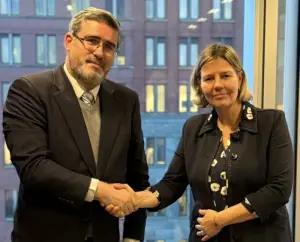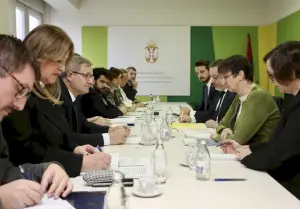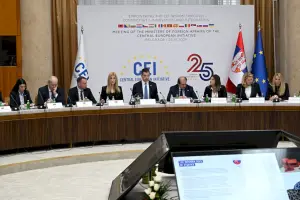Q:
A:
Kosovo problem cannot be solved without direct participation of Belgrade
Belgrade,
23 February 2005
Serbian Deputy Prime Minister Miroljub Labus and Italian Deputy Prime Minister and Minister of Foreign Affairs Gianfranco Fini talked today in Belgrade about bilateral relations of the two countries, the situation in the Balkan region and the process of accession of Serbia-Montenegro to the European Union.
Labus said that during the meeting it was agreed that Serbia-Montenegro plays a key role in maintaining stability in the Balkans. For that reason, when deciding on the relations between Serbia-Montenegro, future status of Kosovo-Metohija and constitutional changes it is necessary to pay special attention to stability in the region.
The question of Kosovo-Metohija was also discussed, Labus said and added that after recent developments it is clear that official Belgrade will be included in negotiations on standards and future status of the province. This means that the Serbian government is expected to put forward its platforms on both issues.
Labus and Fini touched on the issue of the state union and agreed that the situation in the state union should be stable in 2005 so that the problem of Kosovo-Metohija could be solved in the short term.
Speaking about bilateral relations between the two countries, the two officials concluded that Serbia and Italy have well-developed friendly, diplomatic and political relations, and that economic, trade and financial relations will develop very quickly, the Serbian Deputy Prime Minister said.
He added that Italy is one of Serbia’s dominant import and export partners and that significant and increasing investments from Italy are expected this year.
Labus thanked the Italian government on the financial support it has provided to Serbia and for being a major donor to the nation. He described Fini's visit as one by a friend from a country with which Serbia wants to maintain very close political and economic relations.
Italian Deputy Prime Minister and Minister of Foreign Affairs Gianfranco Fini said that the friendship of Serbia and Italy is based on developed economic, financial and trade relations, and on the fact that Serbia is a country which has given a large contribution to the building of Europe's cultural identity. For that reason he started his tour through the Balkans by visiting Belgrade.
Fini stressed that stabilisation of the Balkans is of strategic importance not only for the area, but for Europe as a whole, and especially for Italy which, due to its proximity with Serbia-Montenegro feels more than other countries the negative impacts of instability, as well as the positive impacts of stability.
Stability in the Balkans and Serbia-Montenegrin requires full integration in transatlantic structures and European integration is in the interest of the Serbia-Montenegrin state union, Fini said and added that although it is clear that the dynamics of accession will differ for two member states because of their different starting points, the approach will have to be parallel. That means that Balkan countries have to imagine themselves in the processes of accession to transatlantic and EU structures.
Speaking about Kosovo-Metohija, Fini said that it is necessary to verify very carefully and strictly the kinds of progress that have been made in the province concerning, but not limited to, the reaching of standards, the right to the freedom of movement and the respect for minorities. He said that that this verification has to be carried out very carefully because the principles and values involved there are ones the international community cannot neglect. Representatives of Belgrade authorities are aware of these facts and the international community must understand that these issues cannot be resolved without direct participation of Belgrade, Fini concluded.
The question of Kosovo-Metohija was also discussed, Labus said and added that after recent developments it is clear that official Belgrade will be included in negotiations on standards and future status of the province. This means that the Serbian government is expected to put forward its platforms on both issues.
Labus and Fini touched on the issue of the state union and agreed that the situation in the state union should be stable in 2005 so that the problem of Kosovo-Metohija could be solved in the short term.
Speaking about bilateral relations between the two countries, the two officials concluded that Serbia and Italy have well-developed friendly, diplomatic and political relations, and that economic, trade and financial relations will develop very quickly, the Serbian Deputy Prime Minister said.
He added that Italy is one of Serbia’s dominant import and export partners and that significant and increasing investments from Italy are expected this year.
Labus thanked the Italian government on the financial support it has provided to Serbia and for being a major donor to the nation. He described Fini's visit as one by a friend from a country with which Serbia wants to maintain very close political and economic relations.
Italian Deputy Prime Minister and Minister of Foreign Affairs Gianfranco Fini said that the friendship of Serbia and Italy is based on developed economic, financial and trade relations, and on the fact that Serbia is a country which has given a large contribution to the building of Europe's cultural identity. For that reason he started his tour through the Balkans by visiting Belgrade.
Fini stressed that stabilisation of the Balkans is of strategic importance not only for the area, but for Europe as a whole, and especially for Italy which, due to its proximity with Serbia-Montenegro feels more than other countries the negative impacts of instability, as well as the positive impacts of stability.
Stability in the Balkans and Serbia-Montenegrin requires full integration in transatlantic structures and European integration is in the interest of the Serbia-Montenegrin state union, Fini said and added that although it is clear that the dynamics of accession will differ for two member states because of their different starting points, the approach will have to be parallel. That means that Balkan countries have to imagine themselves in the processes of accession to transatlantic and EU structures.
Speaking about Kosovo-Metohija, Fini said that it is necessary to verify very carefully and strictly the kinds of progress that have been made in the province concerning, but not limited to, the reaching of standards, the right to the freedom of movement and the respect for minorities. He said that that this verification has to be carried out very carefully because the principles and values involved there are ones the international community cannot neglect. Representatives of Belgrade authorities are aware of these facts and the international community must understand that these issues cannot be resolved without direct participation of Belgrade, Fini concluded.











